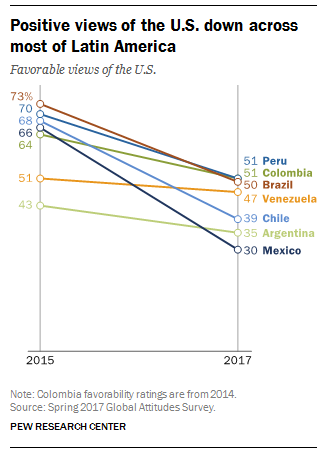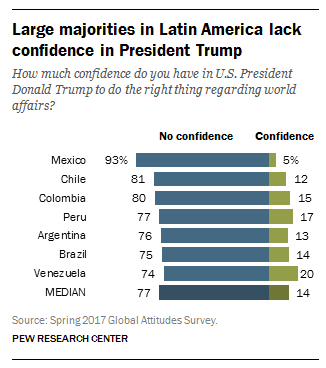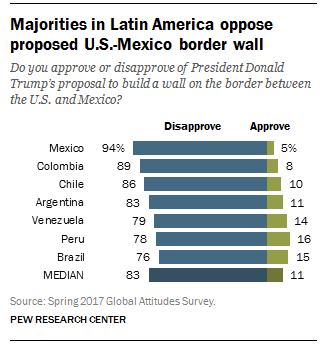 The eighth Summit of the Americas begins this Friday in Lima, Peru. President Donald Trump was originally scheduled to attend the summit, but he has now decided to stay in Washington to address the ongoing crisis in Syria. Vice President Mike Pence will represent the United States in Trump’s place. Pence’s visit comes amid a drop in U.S. favorability across much of Latin America.
The eighth Summit of the Americas begins this Friday in Lima, Peru. President Donald Trump was originally scheduled to attend the summit, but he has now decided to stay in Washington to address the ongoing crisis in Syria. Vice President Mike Pence will represent the United States in Trump’s place. Pence’s visit comes amid a drop in U.S. favorability across much of Latin America. In a 2017 Pew Research Center survey of seven Latin American countries, a median of 47% said they have a favorable view of the U.S. Approval was highest in the summit’s host country, Peru (51%), as well as in Colombia (51%) and Brazil (50%). The U.S. received the least positive ratings in Mexico, where just 30% said they have a favorable view.
These numbers mark a considerable decline since the last Summit of the Americas in 2015. At that time, public opinion of the U.S. in the region was largely favorable: Across the same seven countries, a median of 66% had a favorable view of the U.S., 19 percentage points higher than in last year’s survey.
The decline in favorable opinions of the U.S. across the region was most pronounced in Mexico: About two-thirds of Mexicans (66%) approved of the U.S. in 2015, but that share had fallen 36 points by 2017.
As is the case in much of the world, relatively few people in Latin America express confidence in Trump’s leadership on the global stage. A median of 77% in Latin America said in the 2017 survey that they have no confidence in the U.S. president to do the right thing regarding world affairs. In 2014, just 42% of people in the same seven countries said they had no confidence in then-U.S. President Barack Obama.
 Among 37 countries surveyed globally in 2017, Trump received his lowest ratings on this question in Mexico, where 93% said they have no confidence in the U.S. leader. His proposed wall on the U.S.-Mexico border was also particularly unpopular in the United States’ southern neighbor, where 94% said they disapproved of the project. The border wall was similarly unpopular across the other six Latin American countries surveyed, with a regional median of 83% saying they opposed it.
Among 37 countries surveyed globally in 2017, Trump received his lowest ratings on this question in Mexico, where 93% said they have no confidence in the U.S. leader. His proposed wall on the U.S.-Mexico border was also particularly unpopular in the United States’ southern neighbor, where 94% said they disapproved of the project. The border wall was similarly unpopular across the other six Latin American countries surveyed, with a regional median of 83% saying they opposed it.  Majorities in Latin America also opposed other possible Trump administration policies, including restrictions on people traveling from majority-Muslim countries to the U.S., and U.S. withdrawal from major international trade and climate change agreements.
Majorities in Latin America also opposed other possible Trump administration policies, including restrictions on people traveling from majority-Muslim countries to the U.S., and U.S. withdrawal from major international trade and climate change agreements. Large majorities of people in Latin America also had negative views of Trump’s personal characteristics, describing him as arrogant (a median of 82%), intolerant (77%) and dangerous (66%). However, about three-quarters (77%) also described the president as a strong leader.
The theme for this year’s Summit of the Americas is “Democratic Governance Against Corruption,” with additional focus on corruption’s impact on development and social inequality in the participating countries. The theme is particularly timely for the host country, which saw its president, Pedro Pablo Kuczynski, abruptly resign in March after being accused of accepting illegal payments from a Brazilian construction conglomerate. Kuczynski’s vice president, Martin Vizcarra, was subsequently sworn in as president, and he will represent Peru at the summit.
In 2017, a majority of Peruvians (73%) reported being dissatisfied with the way democracy was going in their country, and just 12% said they trusted their national government to do what is right for their country. Discontent with democracy is rife throughout Latin America, where a regional median of 73% said they were dissatisfied with how democracy is working in their countries.
A majority of Peruvians (60%) also do not feel close to any of their country’s political parties. The share of people who are not affiliated with any political party is high across Latin America: Half or more in Chile (78%), Brazil (60%), Argentina (51%) and Colombia (50%) say they do not feel close to any political party in their country.

אין תגובות:
הוסף רשומת תגובה